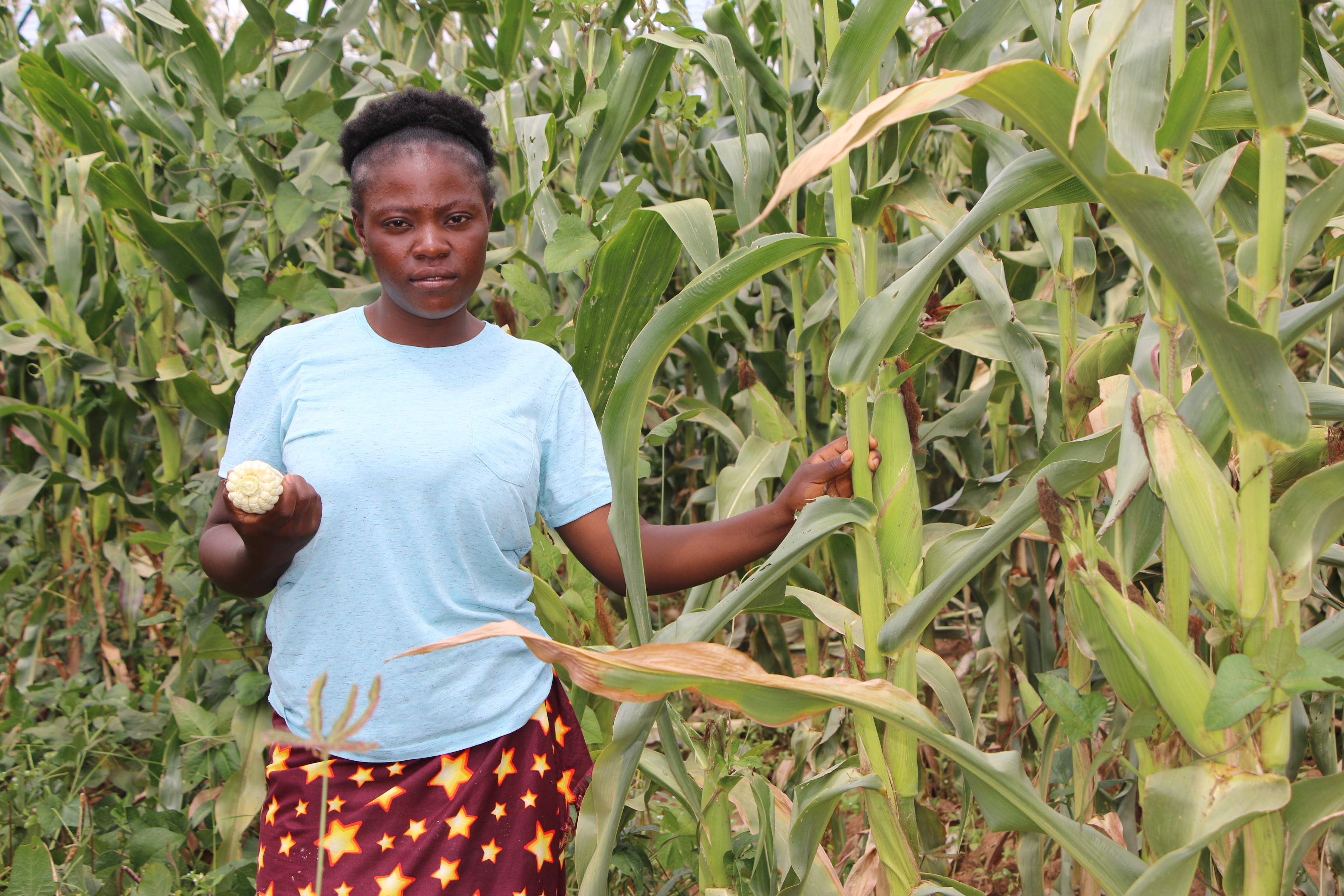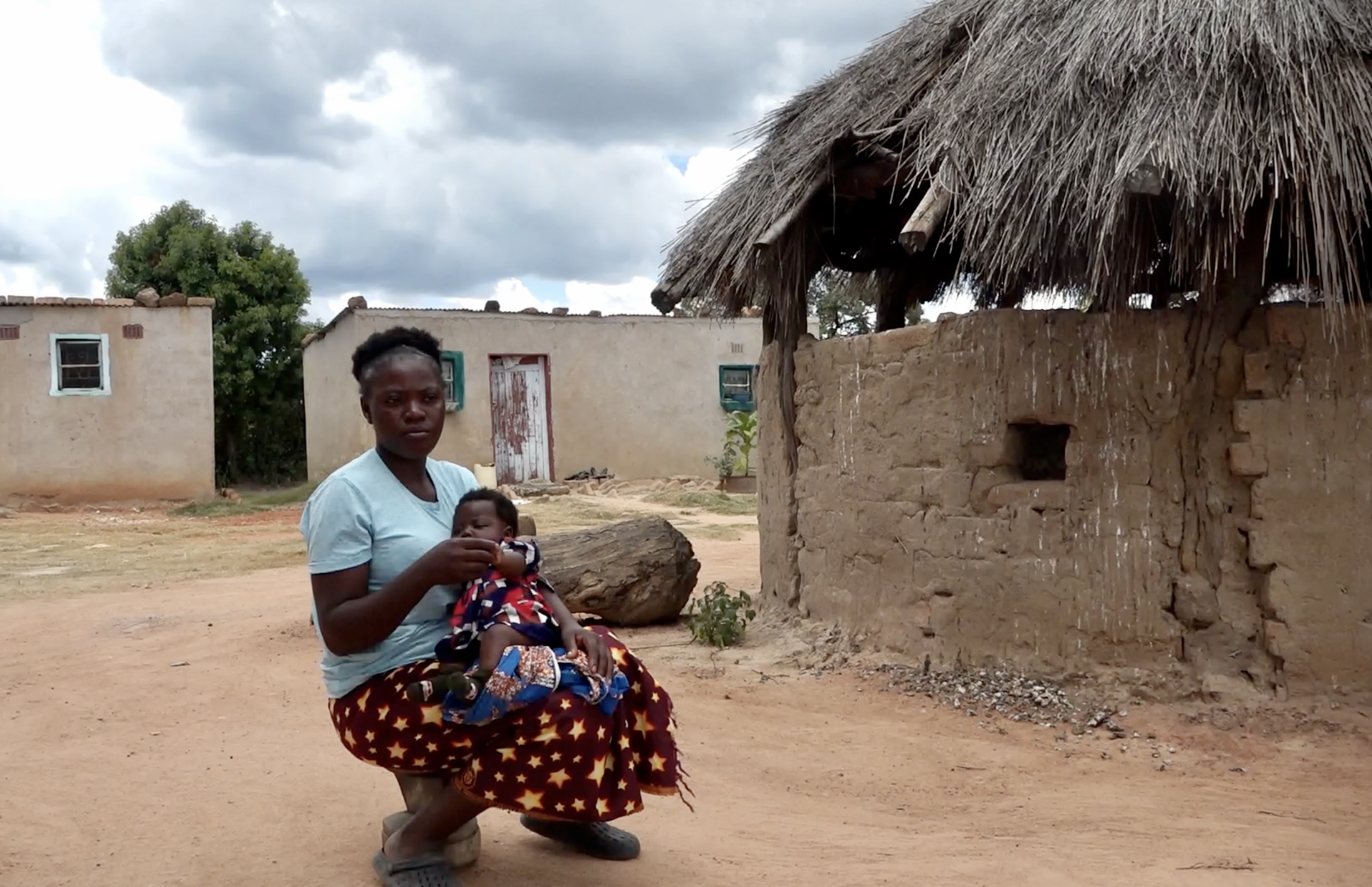
From Struggle to Strength: Young Farmer Misley Zwela Overcomes Drought with Seeds of Hope and a Dream to Return to School
Misley Zwela at her farm in Kalomo district in Zambia
FAO/Mukaba Mukaba
09/07/2025
Kalomo District, Zambia – At just 20 years old, Misley Zwela is a mother, a farmer, and a symbol of resilience. After completing her Grade Twelve school examinations, her hope to pursue further education was interrupted due to pregnancy. She faced the daunting challenge of caring for a baby in a household grappling with drought, hunger, and uncertainty. But thanks to support from the FAO Emergency Response Project, implemented in partnership with the Ministry of Agriculture, Misley is rebuilding her life and planning to pursue a college course in agriculture.
Raised in a farming household in Kalomo District, Misley had always worked alongside her parents in the fields. But when drought struck, her family’s crops withered, their food reserves ran low, and they struggled to meet even the most basic needs.
“I could not continue with my education when I became pregnant. After the drought, we had very little food and I didn’t know how I would care for my child,” Misley recalls. “We had no harvest that year.”
Zambia’s Southern Province, including Kalomo, experienced prolonged dry spells that devastated maize fields and left many families without enough food. For young single mothers like Misley, the crisis was severe. Through local meetings facilitated by agricultural extension staff, Misley learned about the FAO Emergency response to mitigate the impact of El Niño-induced drought on food security and livelihoods of smallholder farmers in Zambia Project, funded by the United Kingdom Foreign, Commonwealth and Development Office (UK-FCDO). The initiative aimed to restore food security and improve livelihoods for drought-affected smallholder farmers.
Misley was selected to participate and received a package that included certified maize and legume seed (soybeans and Mbereshi beans), fertilizer and training in Sustainable Intensification Practices (SIPs). The capacity-building sessions were conducted by Ministry of Agriculture extension staff, with support from FAO’s emergency response technical teams. With guidance from local agriculture officers, Misley applied new techniques such as proper spacing, timely planting, soil improvement using legumes and the efficient use of inputs on her one lima of land. “I followed everything I was taught, how to do intercropping and spacing of crops when planting. My field changed and the crops grew better,” said Misley.
This season Misley harvested over 20 x 50kg bags of maize and 4 x 50kg bags of cowpeas, enough to feed her six-month-old baby, support her family and earn an income from selling the surplus. “I now have enough food and a small income. My child will not go hungry. I even plan to start saving,” she says with much confidence.
Beyond improving her farm, Misley’s success has rekindled a personal goal of returning to school. “Now that I have some support from farming, I want to go to college and pursue agricultural science courses. I completed Grade Twelve but could not continue as I needed to look after my child. I really want to study agriculture or business,” she says.
Misley’s aspiration reflects how livelihood support can also restore dignity, confidence, and long-term ambition for vulnerable young women. Encouraged by her success, Misley hopes to expand her farm beyond one lima and begin mentoring other young farmers in her area. “I want to teach other girls what I’ve learned that farming is a good thing. If I can do it, they can too.”

Misley Zwela with her child at home in Kalomo district
Senior officials from FAO and the Ministry of Agriculture, along with community leaders in Kalomo, have taken note of Misley’s progress and regard her as a role model for rural youth.
“When young people like Misley succeed, they become agents of change. That’s why investing in women and young farmers is so important,” said Suze Percy-Filippini, FAO Representative in Zambia.
“Misley’s story shows the potential that lies in our young people. When we equip them with the right tools and knowledge, they can feed their families, earn incomes, and inspire others,” added Oscar Chita, Assistant Director for Policy and Planning at the Ministry of Agriculture.
The FAO Emergency response to mitigate the impact of El Niño-induced drought on food security and livelihoods of smallholder farmers in Zambia. The project supports smallholder farmers in areas affected by drought through increasing crop and livestock production capacity within a 12-month period. Through the provision of input packages and climate-smart training, the project enables households to restore food production quickly while strengthening long-term resilience.
Where feasible, the project also promotes irrigated crop production on existing or rehabilitated irrigation systems to improve year-round access to food and income. Implemented in close collaboration with the Ministry of Agriculture, the project builds on national structures and empowers local extension officers to deliver hands-on technical support.
Although Zambia received sufficient rainfall this year, the country remains vulnerable to the impacts of climate variability. Building the capacity of rural youth especially young women remains essential to achieving sustainable food systems and improved livelihoods in the face of climate change future shocks.
